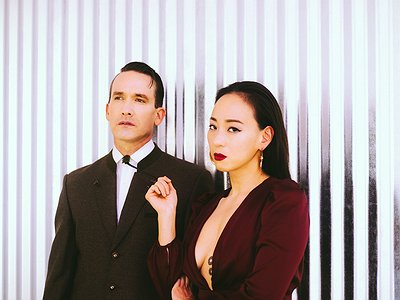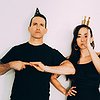Part 2
Could you take us through a day in your life, from a possible morning routine through to your work? Do you have a fixed schedule? How do music and other aspects of your life feed back into each other - do you separate them or instead try to make them blend seamlessly?
As a stone-cold crazy person, having a fairly fixed schedule really helps me stay on Earth and focus on work rather than being nuts. I get up, eat breakfast, do vocal warm ups, answer biz emails, go to the gym or work out at home and then open the door to my studio and walk in until around 9 or 10pm. After that, some kind of night time misbehaviour begins. If I am not overly busy on Wednesdays I have an “input” day wherein I will go to the beach or botanical garden or museum or long walk etc. to try and let the subconscious part of trying to be creative get shaken up and built upon. I suppose in that way; music life is always on. Good food, reading, movies, bad news, cuckoo sex, drugs, being in nature and looking at art all hopefully lead to music.
Could you describe your creative process on the basis of a piece or album that's particularly dear to you, please? Where did the ideas come from, how were they transformed in your mind, what did you start with and how do you refine these beginnings into the finished work of art?
This is a very fair question but I am hesitant to ever be analytical or looking retrospectively at making something. I am always afraid of consciousness upsetting the ship and shining a light on something that has been productive and scaring the elves away. The less thinking, the more making, the better.
There are many descriptions of the ideal state of mind for being creative. What is it like for you? What supports this ideal state of mind and what are distractions? Are there strategies to enter into this state more easily?
Blankness and openness, letting the goddess of music in and listening to what she has to say. Maybe 12% of the time this state is achieved. Mostly it is trying to get the world and my fucking mind to shut off. Quiet and having time support this and as noted a schedule. Keeping office hours of a sort are the main strategy. That said also keeping a little notebook handy at all times to catch the little gifts that are zipping around in the world is helpful too. Being on all the time is being ready all the time. For me, extended breaks do not help at all. I need to keep a momentum going or things atrophy very quickly. I LOVE to travel but one of the trade-offs is that it can take several days to get the music candle burning again.
How is playing live and writing music in the studio connected? What do you achieve and draw from each experience personally? How do you see the relationship between improvisation and composition in this regard?
They are pretty separate for me. The live line-ups of the band and the people involved in recording are rarely the same. I wish they were but it just never seems to work out. I think it is exciting to make a record and then try and figure out how to make it work live even if it is totally different. It is a new creative and arrangement challenge.
How do you see the relationship between the 'sound' aspects of music and the 'composition' aspects? How do you work with sound and timbre to meet certain production ideas and in which way can certain sounds already take on compositional qualities?
I touched on this a little before but it is the basis of inspiration for me. It is almost impossible for me to come to an understanding of what a song wants to be using BS sketch sounds. The worked out and actual sounds need to be mostly there for the feeling to be there. This has led to a long-standing practice of writing and recording happening together. Some sounds are fleeting and need to be snapped up right away or else!
Our sense of hearing shares intriguing connections to other senses. From your experience, what are some of the most inspiring overlaps between different senses - and what do they tell us about the way our senses work? What happens to sound at its outermost borders?
For me there is not a lot of cross over. I close my eyes to really hear and feel and mostly play with my eyes closed. That said, my visual arts and food and psychedelic experiences lead to sonic exploration but they serve more as a basis than as a parallel. My brain is always filled with negative chatter so the fewer editions to that the easier it is to concentrate on sound. I wish that were an easier path for me. The possibilities seem so exciting.
Art can be a purpose in its own right, but it can also directly feed back into everyday life, take on a social and political role and lead to more engagement. Can you describe your approach to art and being an artist?
Again, a fair question but I don’t want to think about it. I want to make something and then move on to making something else. I am absolutely certain that somewhere in my mind there is a set of codified principles and rules that I react to involuntarily but I am more interested into letting it happen than knowing how or why. This is of course the dream approach and I am probably a full-of-shit hippie (aka nature goth).
It is remarkable, in a way, that we have arrived in the 21st century with the basic concept of music still intact. Do you have a vision of music, an idea of what music could be beyond its current form?
It is none of our business to define. Music does not come from us, it comes from somewhere far out in the universe and sometimes we are lucky and get to touch a part of it and play with it. I am intensely curious about what will happen, how we will co-exist with music, how we will be affected by it and how it will grow culturally. The more we try and control it and can control it, the thinner its quality becomes.






